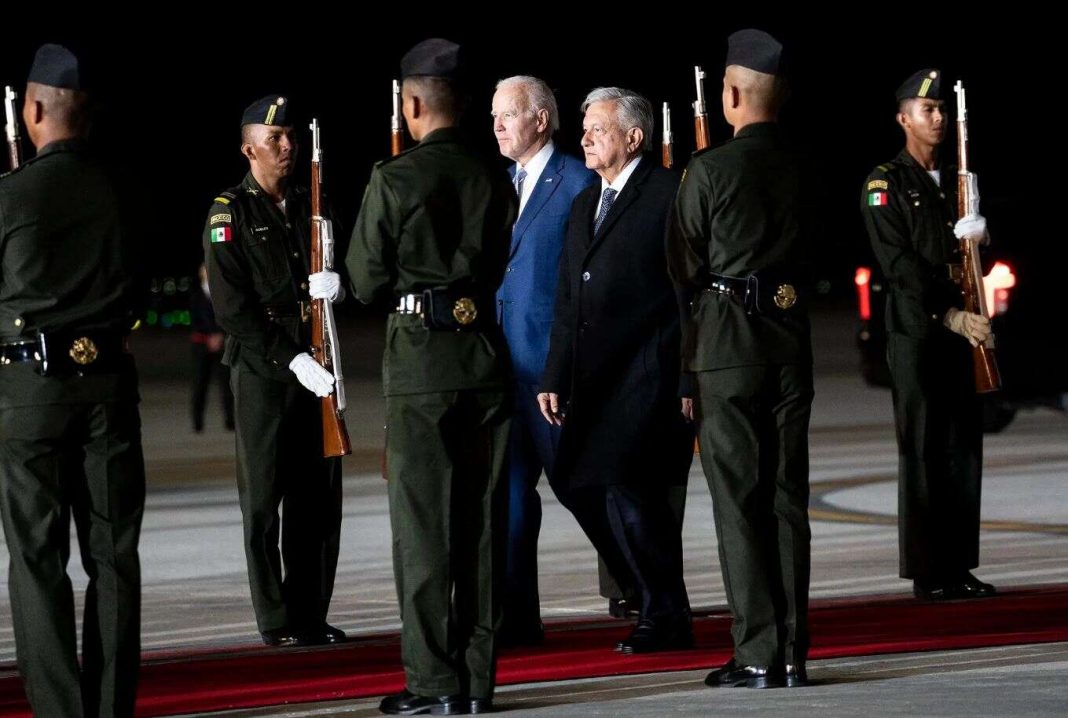President Biden started two days of diplomacy in Mexico City on Monday in an attempt to get additional assistance from Mexico to curb the flow of people fleeing to the United States. He was under increasing political pressure to address the influx of unauthorised migrants at the southern border.
Mr. Biden also seeks more Mexican collaboration in the battle against drug trafficking and the settlement of a disagreement over the Mexican government’s financial backing of its energy industry. He started these discussions with a one-on-one meeting with the country’s president, Andrés Manuel López Obrador, on Monday evening, the second time the two leaders had met in person since Mr. Biden assumed office two years ago.
Before his meeting, Mr. Biden said that the United States and Mexico “must continue to create democratic institutions across the hemisphere and contribute to their development.” He said that both nations are “at one of these inflection moments.”
Officials on both sides of the border have set modest objectives for the North American Leaders Summit involving President Joe Biden, Mexican President Andrés Manuel López Obrador, and Canadian Prime Minister Justin Trudeau. On immigration, for instance, no agreements are anticipated, simply vows to work in that direction.
However, officials also stated that specific agreements reached during the brief meeting were less important than the larger mission of restoring a North American partnership based on cooperation and shared interests, as opposed to the intimidation and conflict that characterised the Trump administration.
Three and a half years have passed since President Donald J. Trump threatened Mexico with severe tariffs, and nearly five years have passed since he tore up an agreement with the Group of Seven nations during a meeting in Canada. Now that Mr. Biden is president, officials from all three nations agree that a closer partnership is essential for enhancing supply chains and surviving economic storms.
Some business executives in the United States are dissatisfied with the absence of concrete, aggressive action items, claiming that economic disagreements between the three nations must be handled quickly.
The Executive President and Director of International Affairs for the U.S. Chamber of Commerce, Myron Brilliant, said, “It is not enough for leaders to just meet.” It is crucial that we see action and transformative change in the manner in which governments interact with the private sector.
Still, according to officials from all three countries, addressing migration is at the top of the agenda for the leaders in this region, even if big policy announcements are unlikely. A U.S. official said that Secretary of State Antony J. Blinken is in daily contact with Mexico’s foreign minister Marcelo Ebrard over migration.
The epidemic and the Ukrainian civil conflict continue to disrupt global supply lines. In Latin America and the Caribbean, an unprecedented food crisis has resulted from inflation and political unrest. And the massive migration of people throughout the hemisphere continues to provide a challenge to the governments of the Americas.
Democrats and Republicans have criticised Mr. Biden for his handling of unprecedented numbers of migrants at the southwest border. The Biden administration said last week that Mexico had agreed to tolerate a considerable increase to 30,000 per month in the rate at which the United States expels migrants.
Now, the United States will refuse Cubans, Nicaraguans, Venezuelans, and Haitians the opportunity to petition for asylum and will promptly return them to Mexico. U.S. officials said on Monday that President Biden may pressure his Mexican counterpart to take even more migrants from other nations in the future, given that the Western Hemisphere is now seeing one of the greatest mass migrations in decades.
The Mexican government and immigration groups in the United States have blasted a policy suggested by the Biden administration last week that would make it very difficult for migrants coming from a “safe third nation,” often Mexico, without first seeking safety there to gain asylum. Saturday, Roberto Velasco, the Mexican Foreign Ministry’s main officer for North America, described the proposal as “a red line for us” since it may lead to a significant increase in the number of migrants in Mexico.
Mexico has not sought the United States for financial assistance to cope with the flow of migrants because it believes doing so would compromise the country’s sovereignty. However, Mr. López Obrador has his own political constraints inside Mexico, where some are irritated by the enormous number of migrants from other parts of the area.
While declaring a crackdown on asylum applications, the Biden administration simultaneously said that it would expand legal migration routes into the United States – a shift that Mexico had requested.

